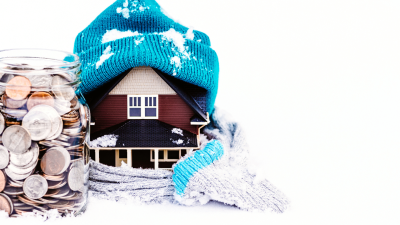What a year! The housing market has seen record-breaking changes that have never been seen before in a single calendar year. From sudden jumps in mortgage rates to drops in demand, there has been no shortage of surprises. So what’s happening right now as the year draws to a close? And how does that affect you?
 How is Inflation Affecting the Housing Market?
How is Inflation Affecting the Housing Market?
One of the biggest changes we’ve seen in the housing market because of inflation is a spike in mortgage rates. The Fed is working to ease the effects of inflation by decreasing demand. In the housing market, this is seen as the rise of mortgage rates. Since the beginning of 2022 alone, these rates have more than doubled, which we’ve never seen before. [1] Experts say this upward trend will continue through the end of the year, but not as drastically as before [2].
As demand has fallen with the increase of mortgage rates, existing buyers have found themselves with more options than before, giving them more bargaining power. But this is still very much a seller’s market. We have seen prices lower in many markets, but the limited supply available has balanced out the decrease in demand, keeping this decline in prices moderate [3].
Despite all these changes as the market continues to shift, most of the challenges that buyers and sellers are facing are only temporary. Experts predict that although we will likely see depreciation through 2023, we will return to a normal rate of appreciation in 2024 and beyond [4].
 What Would a Recession Do to the Housing Market?
What Would a Recession Do to the Housing Market?
Recession is another big topic of conversation for experts right now. Economists have said the chance of a recession is becoming more likely as the year goes on [5]. So what would this do to the housing market?
When you hear recession, you may think that means an inevitable drop in home prices, but that isn’t necessarily true. Of the past six recessions, two saw depreciation, only one of which was more than -2% [6]. So even if we do see a recession within the next year, home prices are still expected to slightly depreciate and then regain their normal levels of annual depreciation by 2024.
What we can expect to see with a recession however, is falling mortgage rates. Of the past six recessions, all of them saw at least a marginal drop in mortgage rates [7]. This is good news for those wanting to buy a home, because a recession would help ease those mortgage rates and make them more affordable.
There is also good news for current homeowners, as the rate of foreclosures is not expected to rapidly increase like it did in 2008. Generally, the accepted rate of foreclosures in any given portfolio of mortgages is about 1%. Right now, we are nationally looking at a rate of 0.4%. So foreclosures are not on the rise like they were leading up to the crisis of 2008. In fact, a key difference between 2008 and what’s happening now is that of the homeowners facing foreclosure (remember, already only 0.4%), about 91% have at least some equity built up in their home. [8] Meaning, if they were to sell their home today, they would still make money from it.
Although a recession would no doubt impact each of us, the effect it would have on the housing market would only push us further down the path towards a more balanced and stable market.
 Should I Wait to Buy a Home?
Should I Wait to Buy a Home?
We’ve talked about the impacts of inflation and recession, but the big question still remains. Is now a good time to buy a home? Let’s break it down.
If you are currently a homeowner, you likely have some equity built up in your home which would give you a boost to put towards purchasing your next one. We also know that today’s market is still a seller’s market. Although homes may not be bought and sold as rapidly as they were during the pandemic, they are still selling. And they are still selling at prices that are giving homeowners a return on investment. Experts say this trend will likely continue and we won’t see the same kind of rapid drop in prices that we did before [9].
For those who are new buyers, prices may seem very daunting at the moment. We are seeing high mortgage rates, high home prices, and limited supply, which can be discouraging for those who don’t have equity from a previous home. However, with what we’ve seen in history and what we learned from 2008, buying a home is all about time.
A home is a long-term investment, so to decide whether or not to buy, we have to look at what the market has done over time and what it is expected to do moving forward. The cost of renting for example, has steadily increased since 1988, and will continue to do so, especially due to the effects of inflation and recession [10]. Renting will only cost you more in the long run, rather than build in value over time like buying.
When comparing the current changes we are facing in the market and the predictions we are seeing from real estate experts, it’s clear that now is just as good a time as any to buy. In fact, waiting to do so may even cost you. One expert said, “if you can find a house that meets your financial expectations for a monthly payment and it is a good time for you to buy, then do that, . . . And if you wait for prices to fall but they never do, you may discover the hard way that the house that you found a year ago that you really loved, that you could afford but you passed up on, is more expensive next year” [11].
We know that experts are predicting prices will drop in the next year, but not crash like they did in 2008. Waiting for a big drop in prices, may very well leave you waiting in vain, and facing even higher prices as homes return to their normal appreciation.
The Takeaway
There are a lot of intimidating, and possibly confusing, topics being discussed in the housing market right now. Inflation has caused sudden jumps in mortgage rates that have left many buyers feeling hopeless. Meanwhile, talk of an impending recession is increasing and causing worries of a repeat of the crash we experienced in 2008.
The important thing to know however, is the current real estate environment is very different from what we saw leading up to 2008. Homes have been steadily appreciating rather than depreciating. Although we will likely see a drop in prices next year, it won’t be nearly as drastic as before, and they will be back to normal levels shortly after. So don’t be discouraged! Though the short-term changes we are seeing in the market may seem scary, the long-term effects are bringing us back to market equilibrium.
Sources
[1]https://www.freddiemac.com/pmms
[2]https://www.freddiemac.com/pmms
[3]https://twitter.com/tayloramarr/status/1578082283281596418
[4]https://wellsfargo.bluematrix.com/links2/html/429eb828-b17e-4e47-8856-4ff59f9d3d1a
[5]https://www.wsj.com/articles/economic-forecasting-survey-archive-11617814998
[6]https://www.thebalancemoney.com/the-history-of-recessions-in-the-united-states-3306011
[7]https://mtg-specialists.com/recession-interest-rates-and-real-estate/
[9]https://twitter.com/tayloramarr/status/1578082283281596418
[10]https://www.census.gov/housing/hvs/files/currenthvspress.pdf
